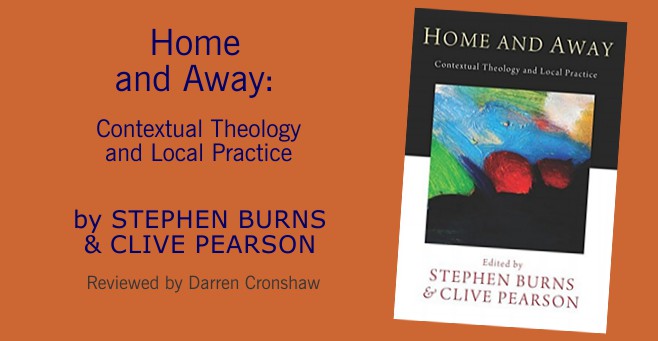
Contextual Theology and Local Practice
By STEPHEN BURNS & CLIVE PEARSON (Editors)
Posted by Darren Cronshaw
One of the most welcome realisations in theological reflection over recent decades is that theology, at its best, is locally constructed, contextualized, culturally appropriate to local contexts, from below, or especially for our geography ‘down under’. Multi-volume systematic theology written for anyone and everywhere are not as useful, relevant nor faithful as theology that is developed out of and in response to local issues and concerns. Theology appropriately gives serious attention to God’s revelation in Scripture and tradition, but also to the place of experience and culture where we find ourselves. One marker of most people’s local context is their postcode – where their place is.
Home and Away offers ten chapters that explore life and theological reflection that starts with a local postcode area – some exploring the postcode of a local area in an attempt to exegete its rhythms and ethos, and some looking at broader and global issues through the lens of or challenging ‘postcode theology’. The authors represent different denominations and continents, although the two editors, Stephen Burns and Clive Pearsons, theologians at Charles Sturt University, have a particular interest in Australia and seven of the chapters engage mainly with Australian postcodes, and all but one of those are Sydney.
Clive Pearson’s introductory chapter invites readers to move beyond nostalgia in reflecting on local culture and really ask ‘Who is Jesus for us today?’ As Pearson urges, our challenge is to ask this question of Bonhoeffer’s for our people in this time of history, and in the local placed context where we are sent. Borrowing from politician Wayne Swan’s analysis of postcode disparities (Postal-Code: The Splintering of a Nation, 2005), Pearson introduces how theology will benefit from bearing the local postmarks and addressing the public issues of our context.
As an example, one of my favourite chapters, admittedly reflecting its postcode proximity to me, is Simon Holt’s ‘Postal Code 3000: Imaging Sacred Space’. As the Senior Minister of Collins Street Baptist Church, Holt asks what role the church can play in the contested space of Melbourne’s CBD and its commerce, politics, education, shopping, art, festivals and tourism. His response is to call the church to foster sacred space and offer hospitality with conversational space about civic values, nurturing local connections for its 18,000 largely vertical neighbours, and practical inclusion of those who are marginalised including transient international students.
Structurally, Stephen Burn’s chapter 7 could have made a neat concluding chapter. It explores the missional possibilities of public worship, churches taking a pastoral interest in their whole parish, and engaging with people’s longing for the sacred aspects of life including special services like baptisms and national rituals like Anzac day. It underlines the importance of developing ministry approaches that accept and express hospitality to people outside the church where they are at, rather than where we hope they would be.
My other favourite chapter, because it was the most challenging, is Susanna Snyder’s ‘Displacing Theology: God-Talk in an “Age of Migration”’. An assumption is that all people have a postcode, but Snyder reminds us that refugees and asylum seekers are desperately in search of a place and home that a postcode represents. As much as we need the local interest of postcode theology, we also need to reflect theologically on the implications of life for people who are ‘postcode-less’. Perhaps more than any other time in history, it is imperative to listen to and learn from the refugee, the vagabond, the other, and what they can teach about hope and suffering, catholicity and communion, consumerism and the importance of finding and knowing our local place in the world.
Home and Away is a good volume on contextual theology and local practice. It offers a broad cross-section of reflection by grassroots practitioners and thoughtful theologians who are developing local worship, working for the welfare of their neighbourhoods, and reimagining how to communicate the gospel in what are often post-church contexts. It will be of interest to those interested in its themes – including church and society, communication media, mission in post-Christendom, mental illness, migration, gender issues – and those who are open for inspiration to similarly engage the task of local theologising in their postcode.
STEPHEN BURNS & CLIVE PEARSON (Editors)
Home and Away: Contextual Theology and Local Practice
Eugene, Oregon: Pickwick 2013
ISBN – 9781610 978873 (pbk), pp.x+154
This review was originally published in Pacifica 28:1 (2015), 94-95.
